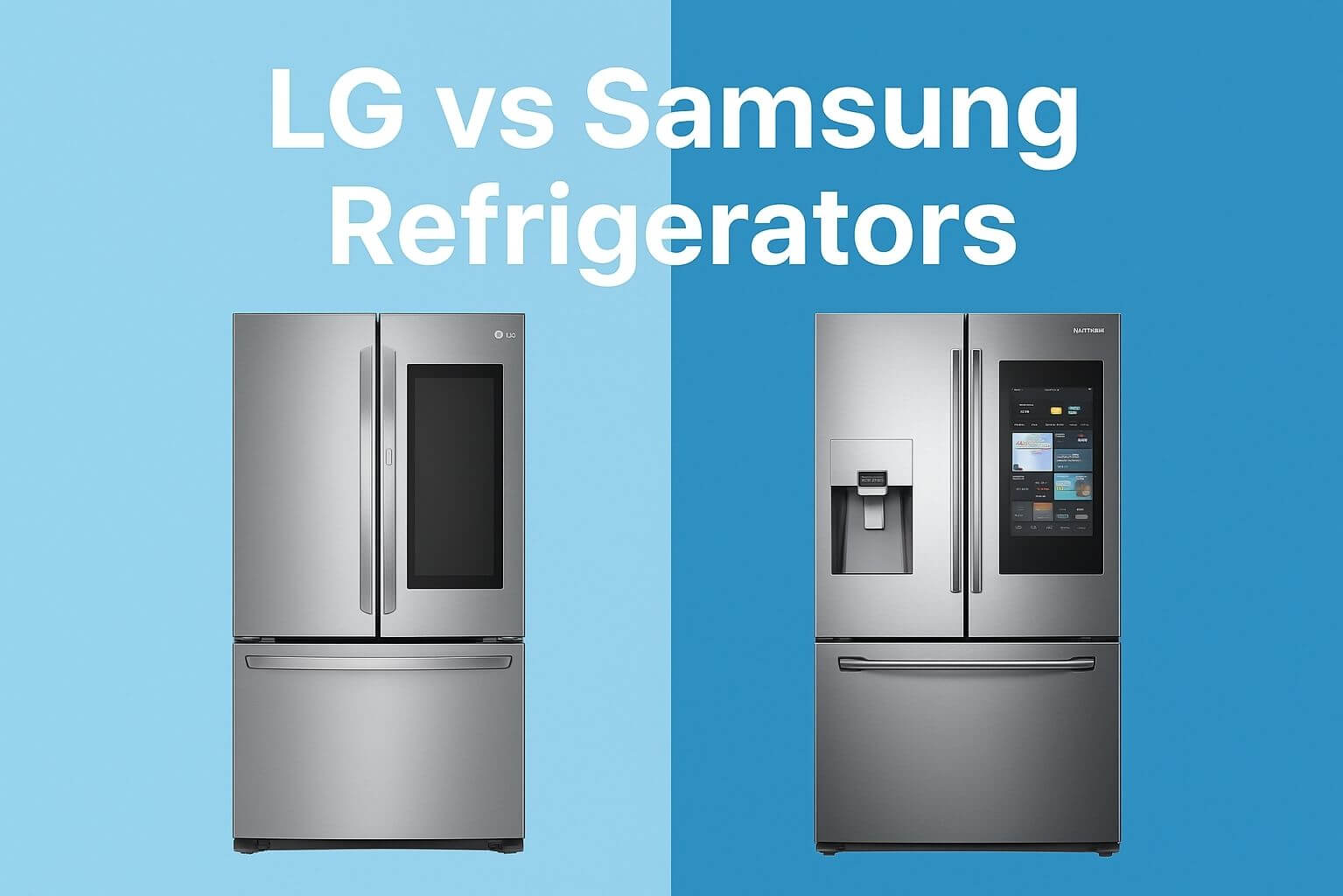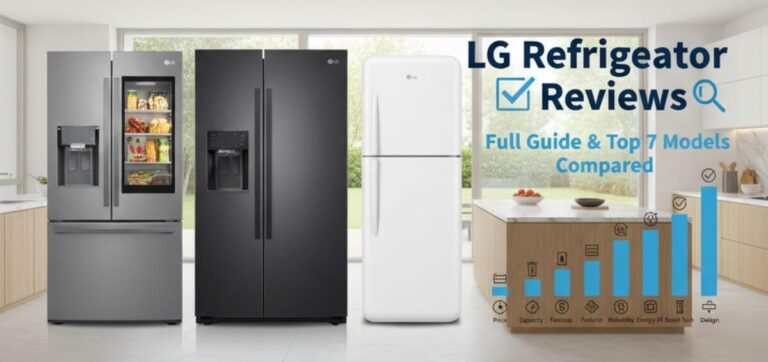LG vs Samsung Refrigerators: Which Brand Should You Buy in 2025?
Last updated on October 2nd, 2025
When it comes to choosing a new fridge, two brands often come to mind: LG and Samsung. Both offer a wide range of models, from basic refrigerators to high-tech, feature-packed designs.
The comparison between LG vs Samsung refrigerators matters because these brands differ in price, features, reliability, and technology. Many people wonder which one keeps food fresher, saves more energy, or gives the best value for the money.
In this guide, we’ll break down the key differences in LG vs Samsung refrigerators, including design, cooling performance, smart features, energy efficiency, price, and reliability. By the end, you’ll have a clear picture of which brand is the right fit for your kitchen and lifestyle.
Brand Overviews: LG vs Samsung Refrigerators
When shopping for a new refrigerator, it helps to understand what each brand is best known for. Both LG and Samsung have earned strong reputations, but they focus on different priorities.
LG Refrigerators
LG refrigerators are designed with practicality and reliability in mind. They’re built to make everyday use simple and efficient, without adding too many extras that might get in the way.

Top Features of LG Refrigerators:
- Consistent Cooling: LG’s cooling systems focus on keeping the temperature steady across every shelf. This means milk, leftovers, and vegetables stay fresher for longer.
- Energy Efficiency: Most LG models are Energy Star certified and come with inverter compressors, which adjust power use and help cut down on electricity bills.
- Space-Saving Designs: Many LG fridges are slimmer and designed to fit comfortably in smaller kitchens without sacrificing storage space.
- InstaView Door-in-Door: Some models let you knock on the door to see inside without opening it, helping to reduce cold air loss.
- Strong Warranties: LG offers long-term compressor warranties, giving buyers extra confidence in their investment.
In short, LG focuses on dependability, energy savings, and user-friendly features that work well in everyday life.
Samsung Refrigerators
Samsung refrigerators are known for style and innovation. They don’t just store food—they’re often designed to feel like the centerpiece of a modern kitchen.

Top Features of Samsung Refrigerators:
- Stylish Designs: Sleek finishes, modern handles, and premium touches make Samsung fridges stand out visually.
- Advanced Cooling: Samsung’s Twin Cooling Plus and Triple Cooling systems keep different compartments at ideal temperatures, which helps fruit, vegetables, and meats stay fresh longer.
- Smart Features: Many models include the Family Hub touchscreen, which can display calendars, recipes, grocery lists, and even stream music or TV.
- FlexZone Compartments: These sections can be adjusted for different uses—like turning a drawer into extra fridge space or a small freezer.
- Wide Price Range: Samsung offers more variety in price, from budget-friendly fridges to premium smart models packed with features.
Samsung’s focus is on technology, design, and flexibility, making them a strong choice for families who enjoy connected devices or want a fridge that feels high-tech and modern.
LG vs Samsung: Quick Comparison Table
| Feature | LG Refrigerators | Samsung Refrigerators |
| Design & Build Quality | Sleek, minimalist, space-saving | Modern, stylish, premium feel |
| Cooling Performance | Linear Cooling & Door Cooling+ for consistent temperature | Twin/Triple Cooling with advanced humidity control |
| Smart Features | ThinQ app, Google/Alexa voice control | Family Hub touchscreen, SmartThings app, smart home integration |
| Energy Efficiency | High Energy Star ratings, inverter compressor | Competitive efficiency; high-tech models may use more energy |
| Price Range | Mid-to-premium | Wide range: budget to premium |
| Reliability & Warranty | Reliable, long-lasting; 10-year compressor warranty | Mixed reliability; 1-year standard, extended available |
Design & Build Quality
When it comes to looks and feel, both LG and Samsung refrigerators have their own personality.
LG refrigerators are all about simplicity and practicality. They often have a sleek, minimalist design that blends in nicely with most kitchens. One of their standout features is the InstaView panel—you knock twice on the door, and the panel lights up to show what’s inside without opening it. That’s handy when you’re trying to keep the kids from standing with the fridge door wide open. LG also tends to make their fridges a little slimmer, which is a big win if you have a smaller kitchen or want to save space.
Samsung refrigerators, on the other hand, lean more toward style and luxury. They usually come with shiny finishes and modern handles that can make your kitchen look a bit more upscale. Many Samsung models also include FlexZone compartments, which are like bonus drawers you can set to different temperatures depending on whether you’re storing drinks, meat, or snacks. It gives you more flexibility in how you use the space. In their higher-end models, Samsung fridges often feel just a little more “premium,” like they’re designed to impress as much as they are to store food.
Takeaway: If you care most about practical space-saving and everyday convenience, LG might be your match. But if you want a fridge that feels stylish and high-end, Samsung has the edge.
Cooling Performance & Technology
At the end of the day, the main job of a refrigerator is simple: keep your food fresh. But LG and Samsung take slightly different approaches to how they do it.
LG refrigerators focus on keeping the temperature steady throughout the fridge. They use something called Linear Cooling and Door Cooling+. In plain terms, this just means the fridge works to keep every shelf at nearly the same temperature—even the spots near the door that usually warm up faster. The result? Your leftovers, milk, and veggies stay fresher for longer without those annoying warm or cold spots.
Samsung refrigerators, on the other hand, put a lot of effort into controlling humidity and airflow. Their Twin Cooling Plus and Triple Cooling systems use separate airflows for different sections of the fridge. Imagine your fruit drawer, meat drawer, and freezer each having their own little climate zone. This helps your produce stay crisp, your meat stay safe, and your frozen foods avoid getting that icy freezer-burn taste.
Takeaway: If you want a fridge that keeps a consistent chill all over, LG is a solid choice. But if your priority is keeping fruits and veggies fresh and crisp, Samsung has the advantage.
Smart Features & Connectivity
These days, refrigerators can do a lot more than just keep food cold. Both LG and Samsung have added “smart” features that connect your fridge to your phone or other devices, but they take different paths.
LG refrigerators keep things pretty straightforward. With the ThinQ app, you can use your phone to check or adjust your fridge settings—like changing the temperature or getting alerts if the door was left open. They also work with Google Assistant and Alexa, so you can use your voice to ask things like, “Hey Google, what’s the temperature in the fridge?” It’s a simple, no-fuss way to stay in control.
Samsung refrigerators aim to feel more like a smart home hub. Many of their models come with the Family Hub touchscreen right on the door. This big screen lets you make grocery lists, leave digital notes for family members, or even stream music while you cook. Through the SmartThings app, your Samsung fridge can also connect with other Samsung devices in your home—like your phone, TV, or even your washing machine—so everything works together.
Takeaway: If you just want easy phone and voice control, LG gives you exactly that. But if you like the idea of your fridge being part of a bigger smart home system (and even acting as a kitchen command center), Samsung takes it further.
Energy Efficiency & Operating Costs
Buying a fridge isn’t just about the price tag in the store—it’s also about how much it costs to run every month. A fridge that uses less electricity can save you quite a bit of money over the years.
LG refrigerators are known for being very energy-efficient. Many models earn high Energy Star ratings, which means they use less power than standard fridges. LG also uses something called an inverter compressor—but all you really need to know is that it helps the fridge use only the amount of energy it needs, instead of running at full blast all the time. This usually means lower electricity bills over the long run.
Samsung refrigerators are also designed to be efficient, and most of their models are competitive when it comes to energy use. But in general, their larger, feature-packed models—especially ones with the Family Hub screen or multiple cooling systems—can use a bit more electricity compared to LG.
Takeaway: If keeping your energy bills as low as possible is a priority, LG has the slight edge. But if you’re leaning toward a Samsung model with more features, just know it may cost a little more to run each year.
Reliability & Maintenance
A refrigerator is a long-term investment, so it’s important to know which brand is more likely to last without constant repairs.
LG refrigerators have built a solid reputation for being dependable. One of their key parts—the linear compressor—is designed to run smoothly and use less energy. LG shows confidence in this technology by offering long warranties, sometimes up to 10 years on the compressor. That means if something goes wrong with this part, you’re usually covered.
Samsung refrigerators are known for being innovative, but their reliability record is a bit more mixed. Many customers love the features, but high-tech models like the ones with the Family Hub touchscreen or multiple cooling systems can be more expensive to repair if something breaks. In short, the more features packed into the fridge, the more there is that could go wrong.
Takeaway: If you want a fridge that’s less likely to give you problems down the road, LG has the edge in reliability. But if you choose Samsung for its advanced features, be prepared for higher repair costs if issues come up.
Price & Warranty Comparison
For most people, price and warranty are two of the biggest factors when choosing a refrigerator. After all, you don’t want to overspend, and you want peace of mind that your fridge will be covered if something goes wrong.
LG refrigerators usually fall in the mid-to-premium price range. They’re not the cheapest, but they’re also not the most expensive. What makes LG stand out is their 10-year warranty on the compressor, which is the heart of the fridge. Since that’s the part that works the hardest, having a long warranty on it adds a lot of value.
Samsung refrigerators offer a wider range of prices. You can find more affordable models if you’re on a budget, but they also sell high-end fridges with big touchscreens and advanced features. Most Samsung models come with a 1-year standard warranty, though you can pay extra for extended coverage if you want more protection.
Takeaway: If you’re looking for long-term security, LG’s extended compressor warranty is a strong advantage. But if you want more pricing options, especially if you’re trying to save money upfront, Samsung gives you more flexibility.
Pros & Cons: LG vs Samsung Refrigerators
To make the choice easier, here’s a simple breakdown of the strengths and weaknesses of each brand:
LG Refrigerators
- ✅ Known for being reliable and long-lasting
- ✅ Energy efficient, which helps lower electricity bills
- ✅ Long warranty on the compressor for peace of mind
- ❌ Fewer flashy features compared to Samsung
- ❌ Usually mid to higher priced, not many budget options
Samsung Refrigerators
- ✅ Modern designs with premium finishes
- ✅ Advanced smart features like the Family Hub screen
- ✅ Wide range of prices, from budget to high-end
- ❌ Mixed reliability, especially with high-tech models
- ❌ Repairs can be more expensive if something breaks
Takeaway: LG is best if you want reliability and lower running costs, while Samsung is a great pick if you value style and cutting-edge features.
Which Brand Should You Choose?
At this point, it really comes down to what matters most in your kitchen and daily life. Both LG and Samsung make excellent refrigerators, but each one shines in different ways.
Choose LG if you want a fridge that feels like a steady, dependable workhorse. LG focuses on reliable cooling, energy savings, and long-term value. If you want a fridge that will quietly do its job year after year without fuss, LG is a safe bet.
Choose Samsung if you’re excited about having a fridge that’s stylish and loaded with smart features. Samsung is all about modern design and premium extras, like touchscreens and flexible storage options. If you want your fridge to feel like part of a connected, high-tech kitchen, Samsung may be the better fit.
Takeaway: If you’re looking for practical reliability, go with LG. If you want a fridge that’s innovative and eye-catching, Samsung is the way to go.
Final Verdict
Choosing between LG and Samsung refrigerators doesn’t have to be complicated. Both brands make great products, but they have different strengths.
LG stands out for reliability, consistent cooling, and energy efficiency. It’s a solid choice if you want a fridge that will last for years and keep your electricity bills in check. Samsung shines with style, smart features, and flexibility. It’s perfect if you enjoy a modern kitchen with high-tech conveniences.
Ultimately, the best choice depends on your lifestyle and priorities. Think about what matters most to you: long-term reliability and energy savings, or smart features and premium design.
Before making a final decision, it’s also a good idea to check specific models. Both LG and Samsung release new versions regularly, so features, prices, and energy efficiency ratings can change. Looking at the latest models ensures you get a fridge that fits your needs today and for years to come.
FAQs: LG vs Samsung Refrigerators
1. Which is better: LG or Samsung refrigerators?
Both brands are excellent, but it depends on your priorities. LG is known for reliability, energy efficiency, and consistent cooling, while Samsung is ideal for stylish designs, smart features, and flexible storage options.
2. Are LG refrigerators more energy-efficient than Samsung?
In general, LG refrigerators tend to use slightly less electricity thanks to their inverter compressors and high Energy Star ratings. Samsung fridges are still energy-efficient, but some high-tech models may use more power.
3. Do Samsung refrigerators have smart features?
Yes! Many Samsung refrigerators come with the Family Hub touchscreen and SmartThings app integration, letting you manage your fridge, make grocery lists, and connect to other smart devices.
4. How long do LG and Samsung refrigerators last?
LG refrigerators are known for long-term reliability and often come with a 10-year warranty on the compressor. Samsung fridges are also durable, but high-tech models may need more maintenance over time.
5. Which brand is better for keeping fruits and vegetables fresh?
Samsung refrigerators with Twin Cooling Plus or Triple Cooling systems excel at controlling humidity and keeping produce crisp. LG also performs well with consistent cooling, but Samsung’s humidity control is often a bit better for fresh foods.
6. Are LG refrigerators more expensive than Samsung?
LG refrigerators usually fall into the mid-to-premium price range. Samsung offers a wider range of prices, from budget-friendly models to high-end premium designs.
7. Should I choose LG or Samsung for a small kitchen?
LG’s slightly slimmer designs and space-saving layouts often make them a better choice for smaller kitchens. Samsung has compact models too, but some high-tech options may take up more space.
8. Where can I find the latest LG and Samsung refrigerator models?
You can check the official LG and Samsung websites, major appliance stores, and trusted online retailers to see the latest features, prices, and energy ratings for both brands.







